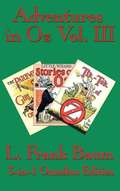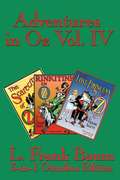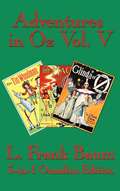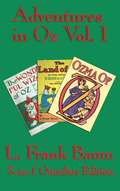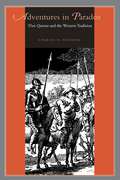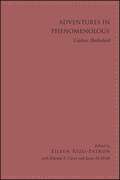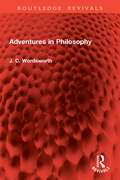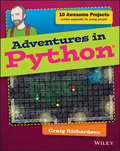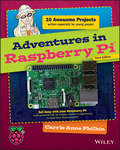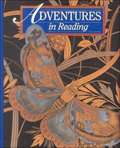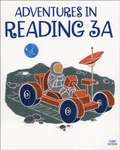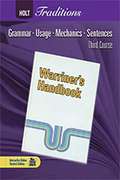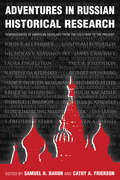- Table View
- List View
Adventures in Oz
by L. Frank BaumExplore the wonder of Oz in this collection of books seven through nine in L. Frank Baum's classic American fairy tale series. The seventh, eighth, and ninth titles of the iconic Oz series, now in one collection! In The Patchwork Girl of Oz, the Munchkins Unc Nunkie and Ojo the Unlucky call on the Crooked Magician, who introduces them to his latest creation: a living girl made out of patchwork quilts and cotton stuffing. But when an accident leaves beloved Unc Nunkie a motionless statue, it is up to Ojo to save him. Can the mighty Wizard of Oz help? In Tik-Tok of Oz, Betsy Bobbin and her loyal mule, Hank, wash up on the shores of an unknown fairyland during a storm. There they meet the clockwork man Tik-Tok and find themselves trapped in a battle with the king of the Nomes. In The Scarecrow of Oz, Cap'n Bill and Trot journey to Oz and, with the help of the Scarecrow, overthrow the cruel King Krewl of Jinxland, who has been busy gathering an army for an invasion of Oz. Will they be able to stop the invasion?
Adventures in Oz
by L. Frank BaumExperience Oz like never before in this collection of books ten through twelve in L. Frank Baum's classic American fairy tale series. The tenth, eleventh, and twelfth titles of the iconic Oz series, now in one collection! In Rinkitink in Oz, Prince Inga of Pingaree must rescue his parents and all of the subjects from his kingdom who were kidnapped by marauders form Regos and Coregos. Prince Inga, along with the visiting King Rinkitink and Bilbil the goat, set off on a series of grand adventures that will lead them to the underground kingdom of the Nome King. Will Inga's bravery and courage be enough to save his parents and all of their subjects? In The Lost Princess of Oz, Ozma, the beloved ruler of Oz, has disappeared, so Dorothy, the Wizard, the Cowardly Lion, and a band of friends must search the vast land of Oz to find her. In The Tin Woodman of Oz, Tin Woodman, Woot the Wanderer, and Captain Fyter set off on a quest to find the lovely Munchkin, Nimmie Amee. Once upon a time, she and the Woodman were going to marry, but then the Wicked Witch of the West turned him to tin. Can the Tin Woodman find Nimmie Amee? And will she remember him?
Adventures in Oz
by L. Frank BaumRevel in the magic of Oz in this collection of the final three books in L. Frank Baum's classic American fairy tale series. The three concluding titles of the iconic Oz series, now in one collection! In The Magic of Oz, the mischievous Kiki Aru has discovered a magical word that can transform him and anyone else into whatever he wants. Worse yet, Kiki has been recruited by the villainous Nome King in his latest attempt to get revenge on Princess Ozma and all her friends. Can Dorothy and the Wizard stop the evildoers before they conquer Oz? Or will Kiki's incredible powers finally give the Nome King the revenge he has craved for so long? In Glinda of Oz, Dorothy and Ozma journey to a remote part of Oz to stop a war between the Flatheads and the Skeezers. But the Flatheads and Skeezers have a different idea. Soon Ozma and Dorothy are trapped in an amazing crystal-domed city on an enchanted island. The watertight city submerges itself, and only the Wizard and Glinda can save them--but will they make it in time? In The Royal Book of Oz, the Scarecrow goes to search for his family roots. He returns to the cornfield where Dorothy first found him and discovers that he is the Long Lost Emperor of the Silver Island. Will he decide to stay there? Or will he return to Oz?
Adventures in Oz
by L. Frank BaumFor generations L. Frank Baum's Land of Oz books have captured and enthralled millions of readers. These stories are as delightful today as they were the day they were written. This omnibus edition contains the first three books: The Wonderful Wizard of Oz, The Marvelous Land of Oz, and Ozma of Oz! Now you can join Dorothy as an earthquake sends her to the land of Mangaboos and the vegetable people in the Dorothy and the Wizard in Oz; journey with Dorothy and Toto as they meet the Shaggy Man, Button-Bright, and Polychrome in The Road to Oz; and in The Emerald City of Oz, Dorothy brings Aunty Em and Uncle Henry along for the adventure!
Adventures in Paper Piecing & Design: A Quilter's Guide with Design Exercises, Step-by-Step Instructions & Patterns to Get You Sewing
by Sarah Elizabeth SharpTurn your interest in foundation paper-piecing into a full-blown love affair. Learn about every stage of the process—from piecing technique to pattern design—in this comprehensive guide. Start with the basics of sewing on paper, then explore the author’s open-ended design exercises to create your own patterns or follow along with the author’s take to sew her graphic interpretations of the prompts. With an annotated overview of the author’s favorite FPP methods, countless tips, and over thirty paper-pieced quilt blocks plus seven design exercises to put your skills to the test, you’ll have the tools you need to thrive when confronted with any paper-piecing challenge! - Build your piecing skills with over thirty graphic paper-pieced blocks inspired by everything from house plants to typography to surface pattern design techniques - Learn how to translate your own reference images or sketches into FPP patterns - Sharpen your pattern-design skills with choose-your-own-adventure style exercises "
Adventures in Paradox: Don Quixote and the Western Tradition (Studies in Romance Literatures)
by Charles D. PresbergCervantes’s Don Quixote confronts us with a series of enigmas that, over the centuries, have divided even its most expert readers: Does the text pursue a serious or comic purpose? Does it promote the truth of history and the untruth of fiction, or the truth of poetry and the fictiveness of truth itself? In a book that will revise the way we read and debate Don Quixote, Charles D. Presberg discusses the trope of paradox as a governing rhetorical strategy in this most canonical of Spanish literary texts. To situate Cervantes’s masterpiece within the centuries-long praxis of paradoxical discourse in the West, Presberg surveys its tradition in Classical Antiquity, the Middle Ages, and the European Renaissance. He outlines the development of paradoxy in the Spanish Renaissance, centering on works by Fernando de Rojas, Pero Mexía, and Antonio de Guevara. In his detailed reading of portions of Don Quixote, Presberg shows how Cervantes’s work enlarges the tradition of paradoxical discourse by imitating as well as transforming fictional and nonfictional models. He concludes that Cervantes’s seriocomic "system" of paradoxy jointly parodies, celebrates, and urges us to ponder the agency of discourse in the continued refashioning of knowledge, history, culture, and personal identity.This engaging book will be welcomed by literary scholars, Hispanisists, historians, and students of the history of rhetoric and poetics.
Adventures in Parenthood
by Dawn AtkinsForget Everest...parenting is a real challenge There aren't many adventures Aubrey Hanson hasn't tried. But parenthood and domestic duties are definitely not for her. Then her twin nieces are orphaned and suddenly Aubrey needs those skills! There's one problem-their gorgeous uncle, Dixon Carter. Officially, he's their guardian and he wants Aubrey involved, just not in charge. Unofficially...well, the spark that caused their almost night together still simmers. In fact, it's threatening to get out of control and disrupt raising the twins. Aubrey and Dixon can't keep the attraction a secret forever. So they need to figure out how to be together...with kids!
Adventures in Parenthood
by Denise Van OutenIn her second parenting book, Denise van Outen recounts, with her trademark warmth and honest, down-to-earth attitude, the joys and challenges of motherhood following the birth of her daughter Betsy with Lee Mead. ADVENTURES IN PARENTHOOD tells the trials and tribulations of those first 18 months of parenthood, when everything is new. Denise believes it's important to be open and to share as a new mum - she has spoken out about breastfeeding and being a working mum in the press - and this book does exactly that. Denise draws not just on her own experience, but also those of her non-celebrity friends. Some of her Twitter followers have also added their own advice and experience. This frank and honest account from Denise is a great holiday read for any new parent who is wondering if anyone else is feeling the same way they are - the answer is usually yes!
Adventures in Parenthood
by Denise Van OutenIn her second parenting book, Denise van Outen recounts, with her trademark warmth and honest, down-to-earth attitude, the joys and challenges of motherhood following the birth of her daughter Betsy with Lee Mead. ADVENTURES IN PARENTHOOD tells the trials and tribulations of those first 18 months of parenthood, when everything is new. Denise believes it's important to be open and to share as a new mum - she has spoken out about breastfeeding and being a working mum in the press - and this book does exactly that. Denise draws not just on her own experience, but also those of her non-celebrity friends. Some of her Twitter followers have also added their own advice and experience. This frank and honest account from Denise is a great holiday read for any new parent who is wondering if anyone else is feeling the same way they are - the answer is usually yes!
Adventures in Phenomenology: Gaston Bachelard (SUNY series in Contemporary French Thought)
by Eileen Rizo-Patron; Edward S. Casey; Jason M. WirthLike Schelling before him and Deleuze and Guattari after him, Gaston Bachelard made major philosophical contributions to the advancement of science and the arts. In addition to being a mathematician and epistemologist whose influential work in the philosophy of science is still being absorbed, Bachelard was also one of the most innovative thinkers on poetic creativity and its ethical implications. His approaches to literature and the arts by way of elemental reverie awakened long-buried modes of thinking that have inspired literary critics, depth psychologists, poets, and artists alike. Bachelard's extraordinary body of work, unduly neglected by the English-language reception of continental philosophy in recent decades, exhibits a capacity to speak to the full complexity and wider reaches of human thinking. The essays in this volume analyze Bachelard as a phenomenological thinker and situate his thought within the Western tradition. Considering his work alongside that of Schelling, Husserl, Bergson, Buber, Heidegger, Merleau-Ponty, Gadamer, Deleuze, and Nancy, this collection highlights some of Bachelard's most provocative proposals on questions of ontology, hermeneutics, ethics, environmental politics, spirituality, and the possibilities they offer for productive transformations of self and world.
Adventures in Philosophy (Routledge Revivals)
by J. C. WordsworthFirst published in 1925, Adventures in Philosophy presents a series of essays dealing with some of the chief problems of metaphysics and beginning with a defence of that somewhat unpopular pursuit. The first part of the book is mainly constructive in character, and not only attempts to put as clearly as possible the metaphysical views of the author but indicates their consequences from an ethical standpoint. The later chapters discuss two of the most important developments in philosophy associated with the names of Einstein and Bergson. Finally, the author considers how far religion, especially the Christian religion, is affected by the conclusions reached earlier in the book. This is an important historical reference for students and scholars of philosophy.
Adventures in Prayer
by Sharon ConnorsPrayer has surged in popularity along with a huge widespread interest in spirituality. Yet in the midst of this, the most frequent questions concerning many who pray are: How should I pray? How does prayer really work? and How can prayer work for me? If we don't really know how to pray effectively, then the process could prove to be hit and miss – with results often being inconsistent. But as ordained minister Sharon Connors reveals, prayer is something that we can all do, and which has the potential to transform our lives – we just have to understand the basic principles and techniques that make it work. ADVENTURES IN PRAYER provides the key to successful prayer. It explains exactly how prayer works, offering a way for people to connect with a higher power, and to answer their deepest questions and needs. Sharon Connors has had extensive – and diverse – prayer experience throughout her ministry, and her approach to prayer is both non-denominational and non-religious, applicable to readers of all faiths and backgrounds who want to heighten their spiritual experience. With clear and simple guidelines, this book shows how we can use prayer successfully to achieve spiritual harmony and wellbeing in all aspects of our lives, including: making difficult decisions, handling change, healing, finding our true purpose, and bringing ourselves closer to the divine in our daily lives.
Adventures in Prayer: Praying Your Way to a God You Can Trust
by Sharon ConnorsThis book is about creating a better life through prayer. Sharon Connors tested the power of prayer over and over as she grew from a frightened, impoverished, but determined single mother of two children to a senior minister who has brought the gift of prayer to thousands. The people she works with ask basic questions like: How should I pray? What if I'm afraid of God or angry at God? How do I know prayer is working? Is it all right to pray for myself and for specific things I want? How can I build my faith? This step-by-step guide provides honest, practical answers--and the inspiration to act on them.Sharon Connors teaches prayer as a learnable technique that improves with daily practice. She interweaves basic principles with moving personal stories from her own life and those she has served, and offers dozens of original prayers and affirmations that address readers' most urgent needs. Building on the conviction that the human mind is a powerful creative force designed to communicate with God, she first shows how to focus the power of mind in prayer. In each chapter that follows, she describes how to use prayer in specific circumstances, including: Healing broken relationships Seeking guidance in times of confusion Transforming the fear of change and mastering life's storms Building prosperity Learning to forgive Finding your purpose in lifeThe final chapter, "Creating Miracles," teaches the "four ways of gratitude," which have the greatest power to turn around our lives.Reverend Connors has explored a wide range of prayer and healing approaches from many spiritual traditions, and these diverse practices are reflected in her book.From the Hardcover edition.
Adventures in Python
by Craig RichardsonThe complete beginner's guide to Python, for young people whowant to start today Adventures in Python is designed for 11-to 15-year oldswho want to teach themselves Python programming, but don't knowwhere to start. Even if you have no programming experience at all,this easy to follow format and clear, simple instruction will getyou up and running quickly. The book walks you through nineprojects that teach you the fundamentals of programming in general,and Python in particular, gradually building your skills until youhave the confidence and ability to tackle your own projects. Videoclips accompany each chapter to provide even more detailedexplanation of important concepts, so you feel supported every stepof the way.Python is one of the top programming languages worldwide, withan install base in the millions. It's a favourite language atGoogle, YouTube, the BBC, and Spotify, and is the primaryprogramming language for the Raspberry Pi. As an open-sourcelanguage, Python is freely downloadable, with extensive librariesreadily available, making it an ideal entry into programming forthe beginner. Adventures in Python helps you get started,giving you the foundation you need to follow your curiosity.Start learning Python at its most basic levelLearn where to acquire Python and how to set it upUnderstand Python syntax and interpretation for moduleprogrammingDevelop the skills that apply to any programming languagePython programming skills are invaluable, and developingproficiency gives you a head start in learning other languages likeC++, Objective-C, and Java. When learning feels like fun, you won'tever want to stop - so get started today with Adventuresin Python.
Adventures in Raspberry Pi (Adventures In ... Ser.)
by Carrie Anne PhilbinBuild cool Raspberry Pi projects with no experience required! Adventures in Raspberry Pi, 3rd Edition is the fun guide to learning programming. Starting from the very basics and building skill upon skill, you'll learn developing fundamentals—even if you've never programmed before. Learning is exciting when you're working your way through cool projects, but the concepts you learn and the skills you master will take you further than you ever thought possible. You'll learn how your Raspberry Pi 3 works and what it can do as you create stories and games, program shapes, code music, and even build Minecraft worlds with projects designed specifically for kids 11 to 15. Author Carrie Anne Philbin is a former high school teacher, and she showcases her skills with clear, easy to follow instructions and explanations every step of the way. If you're interested in programming but find other books hard to understand, this book is your ideal starting point for mastering the Raspberry Pi. Inexpensive, non-intimidating, yet surprisingly versatile, the Raspberry Pi 3 is an ideal way to learn programming. Updated to align with the newest board, this book will teach you fundamental programming skills while having a ton of fun! Get acquainted with your Raspberry Pi's bits and pieces Take control of your Pi's "insides" with simple commands Program games, code music, and build a jukebox Discover where your new skills can take you next The tiny, credit-card sized Raspberry Pi has become a huge hit among kids—and adults—interested in programming. It does everything your desktop can do, but with a few basic programming skills, you can make it do so much more. With simple instructions, fun projects, and solid skills, Adventures in Raspberry Pi is the ultimate kids' programming guide!
Adventures in Reading (Pegasus Edition)
by Fannie Safier Margaret Ferry Wanda SchindleyLiterature textbook.
Adventures in Reading 3A (Third Edition)
by Bju PressCarefully selected third-grade-leveled reading selections will help students improve their reading skills through progressively difficult texts. An element of the BJU Press Reading Grade 3 Curriculum, this is the first of two readers. Divided into two sections - - - "Actions & Attitudes" and "Missions and Memories" - - - each features multiple stories in different genres such as poetry, realistic fiction, biographies, and historical fiction. Feature pages include "think and discuss" and "look again" questions that highlight literary skills, comprehension questions, and vocabulary. Different artistic styles are used for the illustrations. 385 pages, softcover with glossary, 3rd Edition.
Adventures in Reading 3B (Third Edition)
by Kathleen Hynicka Amy Schoneweis Robin E. ScrogginsThe book contains developmentally appropriate selections from a variety of genres with a progression of difficulty in readability and skills to provide success for every student. New Bible retellings closely follow the text in Scripture.
Adventures in Reading 9: Heritage Edition, Revised
by Fannie SafierA collection of short stories, non-fiction, poetry, biographies and essays, along with exercises to encourage reading.
Adventures in Reading: Athena Edition
by Holt Rinehart WinstonStories can be found anywhere and everywhere. Think of the number of different stories that might be inspired by the painting shown on these pages. Examine the painting closely. Use your imagination to write a story. Some of the following suggestions may help you free-write your first thoughts.
Adventures in Russian Historical Research: Reminiscences of American Scholars from the Cold War to the Present
by Samuel H. Baron Cathy FriersonAmerican historians of Russia have always been an intrepid lot. Their research trips were spent not in Cambridge or Paris, Rome or Berlin, but in Soviet dormitories with official monitors. They were seeking access to a historical record that was purposefully shrouded in secrecy, boxed up and locked away in closed archives. Their efforts, indeed their curiosity itself, sometimes raised suspicion at home as well as in a Soviet Union that did not want to be known even while it felt misunderstood. This lively volume brings together the reflections of twenty leading specialists on Russian history representing four generations. They relate their experiences as historians and researchers in Russia from the first academic exchanges in the 1950s through the Cold War years, detente, glasnost, and the first post-Soviet decade. Their often moving, acutely observed stories of Russian academic life record dramatic change both in the historical profession and in the society that they have devoted their careers to understanding.
